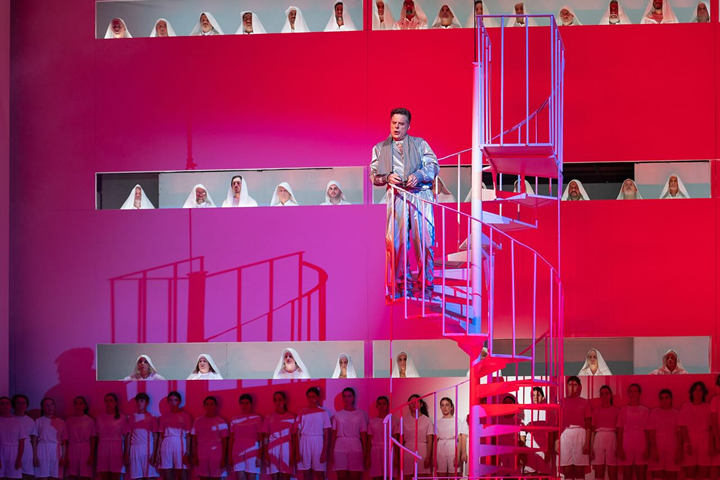| Opera Reviews | 11 May 2024 |
A missed opportunityby Lorenzo Fiorito |
|
Boito: Mefistofele |
|
 |
|
|
The Teatro dell'Opera di Roma opened its new season with Arrigo Boito’s Mefistofele, which gained a warm success, despite Simon Stone’s controversial staging. Boito is best known as the librettist of the late Verdi’s works, Otello and Falstaff, and this is his only opera to still be produced: he composed it in a prologue, four acts and an epilogue, to his own libretto, based on Goethe's Faust. He tried to experiment with new music for his time, as he aimed to refresh the “customary” melodrama, but the first version, presented at the Teatro alla Scala in 1868, was a resounding fiasco. He then reduced the work and re-presented it in Bologna in 1875, with better results. Actually, the melodies are less fluent and less easy than the typical ones of the time, as Boito opposed the standard rhythmic-tonal schemes of his contemporaries with more richness and variety of style. The plot not only deals with the tragic love story between Faust and Margherita, but also includes the philosophical and metaphysical aspects of Goethe’s masterpiece. The director’s extravagant setting led to unsatisfactory results. Most ideas were ends in themselves, and Stone’s goal, as is usual with many modern directors, seemed to startle the audience’s sensibilities more than give a coherent reading. Thus, he didn’t give up any eccentricities, even those that ultimately proved unnecessary or tiresome, unable as he was to mask the lack of a meaningful, conception. A missed opportunity to give dramaturgic importance to Boito's pensive score. The choral scenes, from the prologue in heaven (a white, geometrically squared scene with motionless penitents and cherubs) to the Sabbath, were static and quite standoffish. For Easter Sunday, the scene consisted of a funfair with a carousel and popcorn sellers. To follow, Faust signed his pact with Mephistopheles dressed in a clown suit; Faust's laboratory was full of x-ray plates; the two pairs of lovers (Faust with Margherita, and Mefistofele with Marta) were courting in a pool of small coloured balls, and so on. In short, a succession of pointless gimmicks, none of which giving light and sense, and least of all a unifying framework to Boito’s multi-faceted music. The evening was saved by a good vocal cast and overall by the careful orchestral direction of Michele Mariotti, who made the most of a disciplined Orchestra and Chorus of the Teatro dell'Opera di Roma (the latter masterfully directed by Ciro Visco), with the participation of the Children's Choir of the Teatro dell'Opera di Roma. Mariotti was always precise and cohesive, highlighting the Wagnerian symphonism of the score as well as Boito's ironic and inventive accents. The cast was dominated by the overwhelming vocal and stage presence of John Relyea; his Mefistofele showed off a wide and massive vocal timbre, well controlled both in the high and low registers. As Margherita (and Elena), Maria Agresta stood out with her attractive stage presence and fine singing: she performed “L'altra notte in fondo al mare” with depth and sobriety. Truly a convincing performance for her, greeted by much applause. Joshua Guerrero was a good Faust, but sometimes lacked homogeneity of tone. Nonetheless, the American tenor could easily rise to the high notes with his well-projected singing. The supporting roles were all performed very convincingly, from Marco Miglietta as Wagner (an excellent standout performance) to Leonardo Trinciarelli's Nereo and the mezzo-soprano Sofia Koberidze as Marta and Pantalis. |
|
Photo © Fabrizio Sansoni |
|







